
The initial euphoria phase of the Paul Ryan nomination has already faded, and now Republicans find themselves staring at a cold reality of a campaign that will largely revolve around a wildly unpopular program to reshape the face of government. Alexander Burns, Maggie Haberman, and Jonathan Martin have a staggering report in Politico today that, in more than three dozen interviews with Republican operatives, “ there is an unmistakable consensus among Republican operatives in Washington: Romney has taken a risk with Ryan that has only a modest chance of going right — and a huge chance of going horribly wrong.”
I actually think these Republicans are probably too pessimistic. They’re overestimating the importance of political messaging and strategy, as political operatives tend to do, and underestimating the deeper dynamic of a weak economy and a polarized electorate that should keep the election tight. And yet Romney still seems to have put himself in the position of defending a radical social plan rather than debate the current state of the economy.
Bill Burton, head of the pro-Obama super-PAC Priorities USA, has been writing for a while that its polling and focus groups find the Ryan plan to be completely toxic:
Mostly overlooked among the pundit class is that Ryan’s Medicare proposal is only one driver of the plan’s unpopularity. … Ryan’s insistence on tax cuts for the very wealthiest Americans completely undermines the plan’s stated focus on reducing deficits. In focus groups, voters did not take seriously a supposed deficit reduction plan that also included significant new tax cuts for corporations and the wealthy.
Republican operatives quoted in Politico today confirm the same basic picture:
Another strategist emailed midway through Romney and Ryan’s first joint event Saturday: “The good news is that this ticket now has a vision. The bad news is that vision is basically just a chart of numbers used to justify policies that are extremely unpopular.”
Burton notes again in a recent memo “when told that Romney supported the Ryan plan, many voters simply did not believe it.” The goal of the attacks on Romney’s biography was to make attacks on his plan plausible — to convince voters Romney is the sort of person who would cut social programs to clear budgetary headroom for lower taxes on the rich. If the goal of the Ryan nomination was to escape a losing argument about Romney’s business career, then he has ducked the jab and walked right into the haymaker punch.
Ryan’s ecstatic conservative fans seem to presume that the liabilities of the Ryan plan are confined to Medicare, and that further explicating its details will make Americans warm up to the approach. Neither premise is remotely correct. The entire ideological concept of the proposal — the supply-side premise that tax cuts for the rich are vital to growth, that fiscal sacrifice must be born entirely by domestic spending, that expanding the role of private insurance in Medicare will necessarily create vast improvements — is utterly rejected by most voters. Politically, substance is not Romney’s friend. It’s his enemy.
The discomfort of Romney’s position was already on bright display yesterday. Following the advice of Ryan’s conservative fanboys, Romney took the fight on Medicare to Obama by denouncing the Medicare cuts in the Affordable Care Act, which he described as “robbing Medicare.” Now, there are a couple problems with this line of attack. The first is that the cuts were designed not to impact patient care — it reduced excessive payments to the Bush-created Medicare Advantage program which provides equivalent services at higher cost, and it likewise reduced compensation to hospitals that treat uninsured patients in their emergency room, on the presumption that there will be fewer uninsured people.
The second, larger problem is that Ryan’s budget, in order to make the numbers add up (or pretend to add up) keeps Obama’s Medicare cuts in place. This is problematic in its own terms — the government will slash reimbursements for hospitals treating the uninsured, but rather than reducing the number of uninsured, Ryan will dramatically increase it. This is just one of many social disasters embedded in Ryan’s wild plan. But, of more immediate relevance, it also steps right on Romney’s message. If Romney is so angry about robbing Medicare, why does his running mate’s plan commit the same robbery?
Asked about this at a press conference yesterday, Romney stumbled and then clarified that, unlike Ryan, he will roll back Obama’s Medicare cuts. So, if Romney keeps Ryan’s Medicare plan in other respects — and note that Ryan spends the same amount on Medicare as Obama, he just structures it differently, through private insurance vouchers — then Romney’s plan is to spend more on Medicare than Obama. That could conceivably be a powerful message! Except that Romney also wants to run around saying things like this:
“The truth is we simply cannot simply continue to pretend like a Medicare on track to go bankrupt at some point is acceptable,” Mr. Romney said at a news conference in Miami. “We must take action to make sure that we can save Medicare for coming generations.”
So how exactly does Romney propose to “save Medicare” by spending more money on it? I suspect his answer to this problem will be to stop having press conferences for a while and hope he doesn’t get asked about Medicare. Indeed, the operating plan of the GOP ticket will almost surely be to campaign on the general aura of “specifics” while avoiding actual specifics. That’s Ryan’s specialty, after all. Let the dodging commence.






























